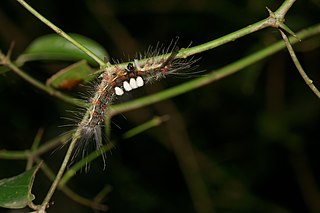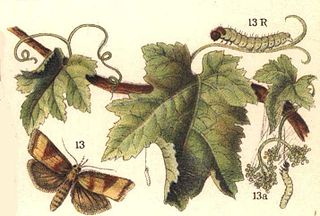| Ferenta | |
|---|---|
| Scientific classification | |
| Kingdom: | Animalia |
| Phylum: | Arthropoda |
| Class: | Insecta |
| Order: | Lepidoptera |
| Superfamily: | Noctuoidea |
| Family: | Erebidae |
| Tribe: | Calpini |
| Genus: | Ferenta Walker, 1857 |
| Ferenta | |
|---|---|
| Scientific classification | |
| Kingdom: | Animalia |
| Phylum: | Arthropoda |
| Class: | Insecta |
| Order: | Lepidoptera |
| Superfamily: | Noctuoidea |
| Family: | Erebidae |
| Tribe: | Calpini |
| Genus: | Ferenta Walker, 1857 |
The International Code of Zoological Nomenclature (ICZN) is a widely accepted convention in zoology that rules the formal scientific naming of organisms treated as animals. It is also informally known as the ICZN Code, for its publisher, the International Commission on Zoological Nomenclature. The rules principally regulate:

The Pterophoridae or plume moths are a family of Lepidoptera with unusually modified wings. Though they belong to the Apoditrysia like the larger moths and the butterflies, unlike these they are tiny and were formerly included among the assemblage called "microlepidoptera".

The Lymantriinae are a subfamily of moths of the family Erebidae. The taxon was erected by George Hampson in 1893.
Neopseustidae is a small family of day and night-flying "archaic bell moths" in the order Lepidoptera. They are classified into their own superfamily Neopseustoidea and infraorder Neopseustina. Four genera are known. These primitive moths are restricted to South America and South east Asia and their biology is unknown. Nematocentropus appears to be the most primitive genus occurring in Assam, Myanmar and Sichuan, China, three species of Neopseustis are distributed from Assam to Taiwan, whilst Synempora andesae and three species of Apoplania occur in southern South America. The morphology of the antennae and the proboscis has been studied in detail.

Arthur Gardiner Butler F.L.S., F.Z.S. (1844–1925) was an English entomologist, arachnologist and ornithologist. He worked at the British Museum on the taxonomy of birds, insects, and spiders.

Coleophora is a very large genus of moths of the family Coleophoridae. It contains some 1,350 described species. The genus is represented on all continents, but the majority are found in the Nearctic and Palaearctic regions. Many authors have tried splitting the genus into numerous smaller ones, but most of these have not become widely accepted.

Gracillariidae is an important family of insects in the order Lepidoptera and the principal family of leaf miners that includes several economic, horticultural or recently invasive pest species such as the horse-chestnut leaf miner, Cameraria ohridella.
Anomoses hylecoetes is a species of primitive hepialoid moth endemic to Queensland and New South Wales, Australia . It is the only species in its genus Anomoses, which is the only genus in the family Anomosetidae.

Eupterotidae is a family of insects in the order Lepidoptera with more than 300 described species.

Epicopeiidae is a family of insects in the order Lepidoptera. They are known as oriental swallowtail moths as they closely resemble some oriental swallowtail butterflies. Epicopeiidae have highly varied structure in regards to body size and wing shape. Epicopeiidaen wing patterns are involved in complicated mimicry rings.

The Batrachedridae are a small family of tiny moths. These are small, slender moths which rest with their wings wrapped tightly around their bodies.

Roeslerstammiidae is a family of insects in the order Lepidoptera. The family arose from the taxonomic uncertainty of the genus Roeslerstammia Zeller, 1839, which was assigned to different families. The genus Roeslerstammia was removed from the Yponomeutidae Stephens, 1829, and placed in the Amphitheridae Meyrick, 1913, which in consequence became a junior synonym of Roeslerstammiidae. Consequently, Roeslerstammiidae comprises the Palearctic genus Roeslerstammia, as well as the Oriental and Australasian genera that form part of the Amphitheridae.
Prototheora is a genus of moths. It is the only genus of the Prototheoridae, or the African primitive ghost moths, a family of insects in the lepidopteran order, contained in the superfamily Hepialoidea. These moths are endemic to Southern Africa.

The Sparganothini are a tribe of tortrix moths.

The Thyatirinae, or false owlet moths, are a subfamily of the moth family Drepanidae with about 200 species described. Until recently, most classifications treated this group as a separate family called Thyatiridae.

Eudonia is a large and widespread genus in the grass moth family (Crambidae), subfamily Scopariinae. There is no common name for the roughly 250 species placed here; new species are still being described regularly. Although the genus was proposed early in the 19th century already, many of these moths were for a long time retained in Scoparia, the type genus of the subfamily and a close relative of Eudonia. A few small genera have been proposed for separation from Eudonia, but given the size of this group this is not particularly convincing; thus, all are retained here pending a comprehensive phylogenetic review.
Mattesia is a genus of parasitic alveolates of the phylum Apicomplexa. Species in this genus infect insects.

Gracillariinae are a subfamily of moths which was described by Henry Tibbats Stainton in 1854.
The Metarbelidae are a family of the Cossoidea also called the carpenter or goat moths, and is sometimes treated as a subfamily, Metarbelinae of the Cossidae. No synapomorphies are shared with the Cossidae based on adult morphology. The family Metarbelidae was first described by Embrik Strand in 1909.
Eugene Gordon Munroe was a Canadian entomologist who discovered numerous species of insects. He worked for the Insect Systematics and Biological Control Unit, Entomology Division in Ottawa, Canada.
| This Calpinae article is a stub. You can help Wikipedia by expanding it. |